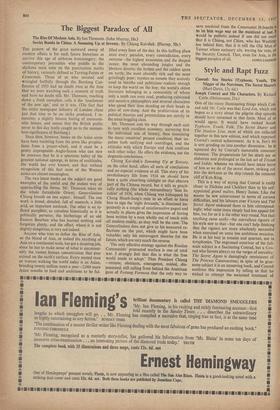The Biggest Paradox of All
The Rise Of Modern Asia. By Ian Thomson. (John Murray, 18s.) Soviet Russia in China: A Summing Up at Seventy. By Chiang Kai-shek. (Harrap, 30s.)
THE pattern of the great eastward sweep of modern affairs is for such future historians as survive this age of airborne ironmongery; the contemporary journalists who paddle in the shallows must seize on the punctuation marks of history, variously defined as Turning-Points or Crossroads. Those of us who sweated and wrangled fretfully through the Bandung Con- ference of 1955 had no doubt even at the time that we were watching such a moment of truth and have no doubt still. Mr. Thomson, reaching down a fresh metaphor, calls it the 'touchstone of the new age,' and so it was. (The fact that the entire newspaper industry of ,London chose just that time to be on strike produced, I re- member, a slightly bizarre feeling of unreason- able leisure, and meant that the British public never to this day really caught on to the momen- tous significance of Bandung.) Since then, however, books on the Asian scene have been tumbling from the press like propitia- tions from a prayer-wheel, and it must be a pretty impregnable Anglo-Saxon who can now be unaware that he is a spectator today of the greatest national upsurge, in terms of multitudes, the world has ever known, end that without recognition of this fact most of the Western antics are almost meaningless.
The two latest books on the subject are good examples of the useful and the useless way of approaching the theme. Mr. Thomson takes on the whole formidable Orient; Generalissimo Chiang broods on one aspect: himself. The one work is broad, detailed, full• of research, a little arid, an important textbook. The other is an, in- flated pamphlet, as valueless historically as it is politically perverse; the bletherings of an old Eastern Bourbon who has learned nothing and forgotten plenty, and the effect, where it is not slightly dangerous, is very sad indeed.
Anyone who tries to define the Rise of Asia, or the Mood of Asia, or indeed the anything of Asia on a continental scale, has got a daunting job, since he has to make sense of what is uncontest- ably the vastest human concentration that ever existed on the earth's surface. Every second man or woman walking the world today is an Asian, breeding twenty million more a year-2,000 more Asian mouths to feed and ambitions to be ful- filled every hour of the day. In this baffling place exist every paradox, every contradiction, every extreme—the highest mountains and the deepest ocean; the most abounding jungles and the bleakest deserts; the hottest and the coldest spots on earth; the most absurdly rich and the most grindingly poor; mystics so remote they scarcely need to breathe and politicians' realistic enough to keep the world on the hop; the world's oldest literature belonging to a community of whom only a tenth can even read, producing cultivated and sensitive philosophers and revered characters who spend their time standing on their heads in piles of cow-dung. And the proliferation of its political theories and potentialities are strictly in the mind-boggling class.
Mr. Thomson cuts his way through each unit in turn with excellent economy, surveying first the individual sets of history', then examining the many countries' present condition, their im- pulses both unifying and centrifugal, and the attitudes with which Europe and Asia confront each other today. He offers the evidence, not the dogmatic conclusions.
Chiang Kai-shek's Summing Up at Seventy, on the other hand, offers all sorts of conclusions and no especial evidence at all. This story of his revolutionary life from 1924 on should have been a quite absorbing sidelight on that obscure part of the Chinese record, but it tells us practi- cally nothing (the whole extraordinary 'Sian In- cident' of 1936, when Chiang was kidnapped by Chang Hsueh-liang's men in an effort to force him to sign the 'eight demands,' is dismissed im- patiently in a couple of uninformative pages) and actually in places gives the impression of having been written by a man wholly out of touch with all modern reality, as may well be the case. The Generalissimo does not give us his measured re- flections on the past, which might have been valuable; only his extravagant theories for the future, which are very much the reverse.
'The only effective strategy against.the Russian Communists' protracted warfare is one of total war. I strongly feel that this is what the free world needs to adopt.' Thus President Chiang —remote, obstinate, courageous, misled, dis- possessed, still calling from behind the American guns of Festung Formosa that the only way to save mankind from the Communist H-bombs is to let him wage war on the mainland at last. It would be pathetic indeed if one did not recall that it is Chiang, not China, who has Washing• ton behind him; that it is still the Old Man of Taiwan whose emissary sits, waving his veto, on the Security Council. That, even for Asia, is the






































 Previous page
Previous page